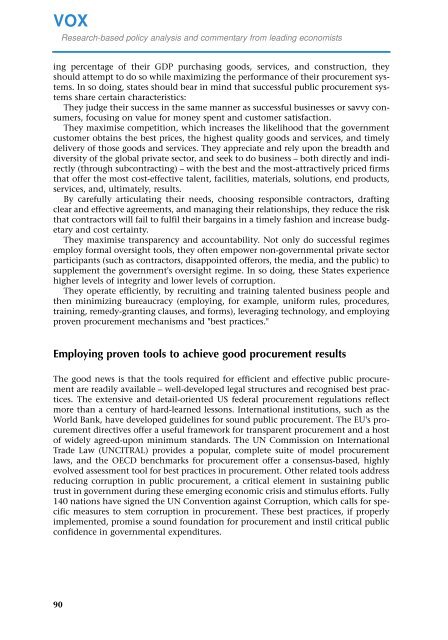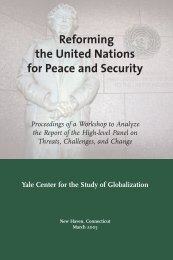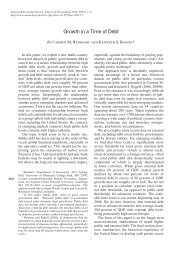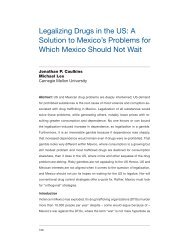The collapse of global trade, murky protectionism, and the crisis:
The collapse of global trade, murky protectionism, and the crisis:
The collapse of global trade, murky protectionism, and the crisis:
Create successful ePaper yourself
Turn your PDF publications into a flip-book with our unique Google optimized e-Paper software.
VOX<br />
Research-based policy analysis <strong>and</strong> commentary from leading economists<br />
ing percentage <strong>of</strong> <strong>the</strong>ir GDP purchasing goods, services, <strong>and</strong> construction, <strong>the</strong>y<br />
should attempt to do so while maximizing <strong>the</strong> performance <strong>of</strong> <strong>the</strong>ir procurement systems.<br />
In so doing, states should bear in mind that successful public procurement systems<br />
share certain characteristics:<br />
<strong>The</strong>y judge <strong>the</strong>ir success in <strong>the</strong> same manner as successful businesses or savvy consumers,<br />
focusing on value for money spent <strong>and</strong> customer satisfaction.<br />
<strong>The</strong>y maximise competition, which increases <strong>the</strong> likelihood that <strong>the</strong> government<br />
customer obtains <strong>the</strong> best prices, <strong>the</strong> highest quality goods <strong>and</strong> services, <strong>and</strong> timely<br />
delivery <strong>of</strong> those goods <strong>and</strong> services. <strong>The</strong>y appreciate <strong>and</strong> rely upon <strong>the</strong> breadth <strong>and</strong><br />
diversity <strong>of</strong> <strong>the</strong> <strong>global</strong> private sector, <strong>and</strong> seek to do business – both directly <strong>and</strong> indirectly<br />
(through subcontracting) – with <strong>the</strong> best <strong>and</strong> <strong>the</strong> most-attractively priced firms<br />
that <strong>of</strong>fer <strong>the</strong> most cost-effective talent, facilities, materials, solutions, end products,<br />
services, <strong>and</strong>, ultimately, results.<br />
By carefully articulating <strong>the</strong>ir needs, choosing responsible contractors, drafting<br />
clear <strong>and</strong> effective agreements, <strong>and</strong> managing <strong>the</strong>ir relationships, <strong>the</strong>y reduce <strong>the</strong> risk<br />
that contractors will fail to fulfil <strong>the</strong>ir bargains in a timely fashion <strong>and</strong> increase budgetary<br />
<strong>and</strong> cost certainty.<br />
<strong>The</strong>y maximise transparency <strong>and</strong> accountability. Not only do successful regimes<br />
employ formal oversight tools, <strong>the</strong>y <strong>of</strong>ten empower non-governmental private sector<br />
participants (such as contractors, disappointed <strong>of</strong>ferors, <strong>the</strong> media, <strong>and</strong> <strong>the</strong> public) to<br />
supplement <strong>the</strong> government's oversight regime. In so doing, <strong>the</strong>se States experience<br />
higher levels <strong>of</strong> integrity <strong>and</strong> lower levels <strong>of</strong> corruption.<br />
<strong>The</strong>y operate efficiently, by recruiting <strong>and</strong> training talented business people <strong>and</strong><br />
<strong>the</strong>n minimizing bureaucracy (employing, for example, uniform rules, procedures,<br />
training, remedy-granting clauses, <strong>and</strong> forms), leveraging technology, <strong>and</strong> employing<br />
proven procurement mechanisms <strong>and</strong> "best practices."<br />
Employing proven tools to achieve good procurement results<br />
<strong>The</strong> good news is that <strong>the</strong> tools required for efficient <strong>and</strong> effective public procurement<br />
are readily available – well-developed legal structures <strong>and</strong> recognised best practices.<br />
<strong>The</strong> extensive <strong>and</strong> detail-oriented US federal procurement regulations reflect<br />
more than a century <strong>of</strong> hard-learned lessons. International institutions, such as <strong>the</strong><br />
World Bank, have developed guidelines for sound public procurement. <strong>The</strong> EU's procurement<br />
directives <strong>of</strong>fer a useful framework for transparent procurement <strong>and</strong> a host<br />
<strong>of</strong> widely agreed-upon minimum st<strong>and</strong>ards. <strong>The</strong> UN Commission on International<br />
Trade Law (UNCITRAL) provides a popular, complete suite <strong>of</strong> model procurement<br />
laws, <strong>and</strong> <strong>the</strong> OECD benchmarks for procurement <strong>of</strong>fer a consensus-based, highly<br />
evolved assessment tool for best practices in procurement. O<strong>the</strong>r related tools address<br />
reducing corruption in public procurement, a critical element in sustaining public<br />
trust in government during <strong>the</strong>se emerging economic <strong>crisis</strong> <strong>and</strong> stimulus efforts. Fully<br />
140 nations have signed <strong>the</strong> UN Convention against Corruption, which calls for specific<br />
measures to stem corruption in procurement. <strong>The</strong>se best practices, if properly<br />
implemented, promise a sound foundation for procurement <strong>and</strong> instil critical public<br />
confidence in governmental expenditures.<br />
90





